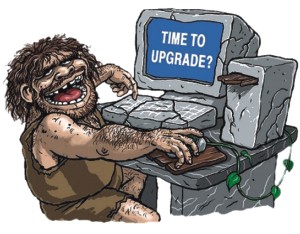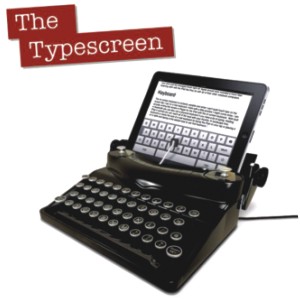Revolution When the wheels stop turning
By Jannatul Ruhan Raha
The monitor is going off and on... on and off... off and on and your heart starts pounding faster. You start sobbing, because you know it is happening again. The room is enveloped by an aura of horrific destiny, like a train heading for a broken bridge. The insubordinate motherboard in coalition with the monitor has declared sovereignty and is, as of now, no longer under your control.
 Frustration and helplessness has you in its grips, firstly because your dad has taken away your laptop, and secondly because the internet features aren't that good in your Nokia 5600. You sit back in your chair and start saying things to your computer that would make your mother bash your head in. You start thumping the system unit on the floor, almost as if you wanted to crush the thing. Let's be honest, you do want to do that. You start pondering the horrible consequences that lie ahead. You think about how much you'll miss logging into Facebook and chatting with that hottie, about the pending notifications, about the posts by your friends on your wall, the frapes you are missing out on...
Frustration and helplessness has you in its grips, firstly because your dad has taken away your laptop, and secondly because the internet features aren't that good in your Nokia 5600. You sit back in your chair and start saying things to your computer that would make your mother bash your head in. You start thumping the system unit on the floor, almost as if you wanted to crush the thing. Let's be honest, you do want to do that. You start pondering the horrible consequences that lie ahead. You think about how much you'll miss logging into Facebook and chatting with that hottie, about the pending notifications, about the posts by your friends on your wall, the frapes you are missing out on...
When you go to coaching, your friends talk about the new genjam that began in FB and you're left out because you have no clue what they're on about. When you hear from your friend how awesome Metallica's new song is, you curse the impotency of your dynamic speakers. The recently installed Assassin's Creed has perished without an hour of gameplay. The walls are closing in.
Near desperation, you login to your email account from the school computer lab at recess and to your dismay; you realise that it is so slow that the break ends before one can actually sign in to Gmail. You end up getting lower grades for your research papers because the others have access to the net and you don't. After all, the teacher won't understand that the cyber cafe was too crowded.
And the worst part? Your father doesn't seem to care one whit about your struggles to live without a computer. His only “rational” deduction is that you want the computer back to socialise. He reminds you of your O'levels [still a year off] and asks you to stop nagging about a computer and start concentrating on your studies. You notice that if you pressurise a little bit more, he complains about financial limitations when in reality he is living like a king, running a car on petrol. You refuse to give up entirely and decide to protest by spending an angry sleepless night with the lights on. Your eyes are, of course, closed.
Time passes. And you slowly stop being bothered about the loss of the PC. One day a new one enters the scene. A shiny black one. Your dad bought it for you and wrapped it up in a nice pink ribbon with a bow on top. And you jump around and yell with joy and immediately start looking for that link to Assassin's Creed in torrent sites.
And then something itches. And you scratch, smearing blood all over your leg. And you realise you should have held the protest under a mosquito net.
You crane your head and look at the desk. The dark monitor gives you a silent mocking laugh.

The QWERTY madness
The what, why and huh(?) behind the crazy keyboard ways
By Neshmeen Faatimah
All my life, I wondered why the letters on a keyboard were arranged the way they are - QWERTY instead of ABCDE. Why the crazy randomness? Wouldn't it be easier to just have them in alphabetical order? I came to the conclusion that it was because Qwerty made us more efficient and enabled us to type faster, arranging the letters conveniently in terms of frequency. One fine day I researched into it. Turns out, I was wrong. Qwerty didn't make us more efficient - it had the opposite effect - one of actually slowing us down. And to my utter surprise, the effect was intentional, rather than accidental. Qwerty was never meant to make us faster; an alternate arrangement, called the Dvorak layout was. But Qwerty was the layout to become popular, and Dvorak never did.
 What's the story? In a Qwerty layout, the letters are actually arranged so that the most common letters are not close together and a typist has to move his fingers through long distances between the rows to type them. A Dvorak keyboard placed all the common letters together in the middle row, called the home row so that our fingers wouldn't have to move at all to type them. The left hand side had all the vowels and some consonants and the right hand side only had consonants. This layout made a typist a lot faster.
What's the story? In a Qwerty layout, the letters are actually arranged so that the most common letters are not close together and a typist has to move his fingers through long distances between the rows to type them. A Dvorak keyboard placed all the common letters together in the middle row, called the home row so that our fingers wouldn't have to move at all to type them. The left hand side had all the vowels and some consonants and the right hand side only had consonants. This layout made a typist a lot faster.
But these keyboard layouts were originally made for typewriters. Typewriters had a movable carriage, a lever for turning paper from line to line, and a keyboard on which the letters were arranged in alphabetical order. But there was a technical problem with this arrangement - the machine would jam if keys that were side by side were pressed simultaneously when a typist worked quickly.
So in 1875, Christopher Sholes, the inventor of typewriters, tried to solve the problem by forcing the typist to be slower. He rearranged the keys so that the common keys were far from each other and the type bars would come from different directions and not jam the typewriter. This inefficiency was required so that the annoying clashes would be reduced and the resultant effect would be one where the typing is sped up rather than made slow. The Dvorak layout, therefore, even after being a faster method, wasn't accepted.
But after the era of typewriters was over and the era of keyboards entered, there was supposed to be no use for Qwerty. Nevertheless, Qwerty prevails to this day and rules the land of keyboards, proving that human habit is indeed very hard to get rid of. If you want to try out the Dvorak layout, you can search up how to switch your keyboard to a Dvorak configuration by changing a setting on your computer's operating system. Or you could just pry off the keys and rewire them that way.
TV show review
Mirakkel
By Sarah Nafisa Shahid
Mirakkel is an Indian which airs on Zee Bangla every Monday to Wednesday at 10pm hosted by Mir, who apparently is the King of Comedy. He is kind of funny actually which is why the earlier seasons were such a big hit, making it a nice Bangla show to share with the family after dinner.
The sixth season, however, has more for us because the producers of the show decided to audition stand-up comedians from Bangladesh and the response from this side of the border was immense. Sadly, most contestants had only bagfuls of cliché jokes dressed in different dialects to offer to the judges. Old school punch lines like 'Kon bel khawa jay na? Marble' and 'Kon driver gaari chalay na? Screwdriver' were plenty. But don't worry; the contestants who were actually chosen to continue with the program are not all that bad, though even their jokes are just clichés incorporated with a lot of hand gesture and funny noises. The earlier contestants from Bangladesh in the competition like Anu Hena Roni really shined bright with a genuine talent for stand up comedy which is probably why the producers decided to go for the ongoing extension version of season six.
This show, like most Indian shows, puts on a display of flashy stages, exaggerated laughs and animated sound effects to dress up the acts but that is what comedy shows are suppose to be like. And if you have enjoyed watching the comedy shows of Mumbai like Comedy Circus and The Great Indian Laughter Challenge then you would definitely want to watch this because it provides more down to earth performances and in our native language. The judges are more analytical than those of the aforementioned shows. But if you prefer the likes of Russell Peters, then this show can only help bring the family together for a little bit of bonding because even if the jokes don't seem funny enough for you, they crack your parents up. The best part of the show is that Bangladesh is represented in a somewhat international platform and we can vote for these contestants.
Wishful news
Shakil Khan in the final Twilight movie?
Should it happen?
Entertainment desk
(Jawad...yeah, he's a desk)
Just when internet critics and the sane part of the world thought the Twilight franchise couldn't suck (!) more, a breath of fresh air cooled the scenario when Numba Wan Shakil Khan announced his intention to star in the final instalment of the films, Breaking Dawn part 2. “I thought long and hard and chewed on the facts but I just couldn't put my teeth through it: why do people hate it so much? Then I realised, they hate it because I am not in it. I am fabulous,” he said to this reporter. He informed that he had already taken up initiative to revive the franchise by befriending the director on Facebook. He mentioned that he might also have a few pointers for the director as well as “the deadpan girl” (Kirsten Stewart), those boys, the makeup men, the lighting supervisor and the camera crew.
When asked about this, Kirsten Stewart expressed her excitement at seeing the numba wan actor Shakil Khan in action. Those boys refused to comment on this. On a statement issued by the White House, the US President said, “I was squealing like a fan girl when I heard of his interest in starring in a Hollywood film. The world needs an actor like Numba Wan Shakil Khan.”
